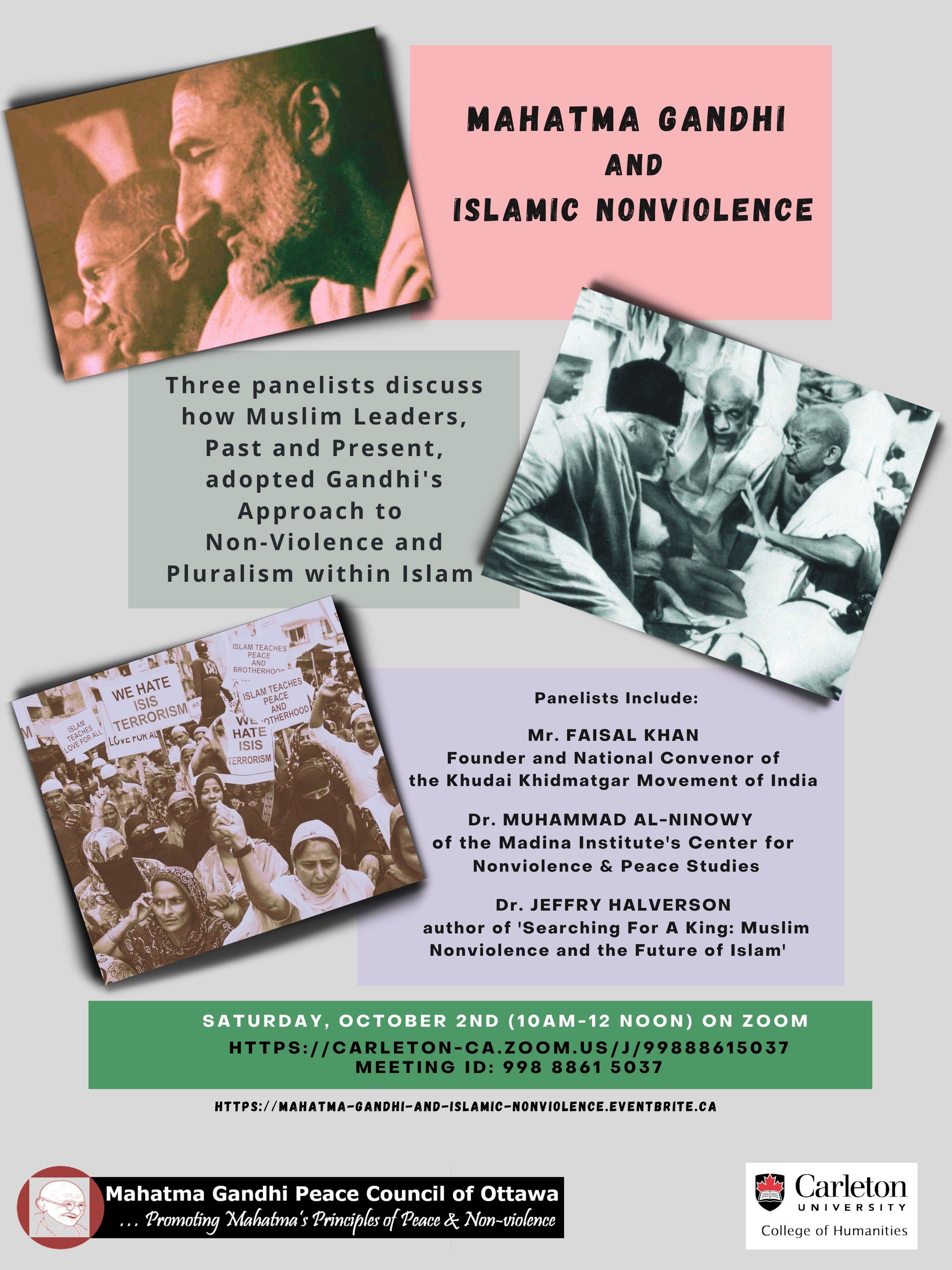Gandhi Jayanti 2021 - Garlanding of the Statue
M. K. Gandhi Annual Lecture 2021
Panel Discussion on "Mahatma Gandhi and Islamic Nonviolence"
Panelists: Mr. Faisal Khan, Dr. Muhammad Al-Ninowy, and Dr. Jeffry Halverson
2021 M. K. Gandhi Annual Lecture/Panel Discussion
TOPIC: “Mahatma Gandhi and Islamic Nonviolence”
AGENDA:
9:45-10:00 AM Participants log into the meeting room
10:00-10:05 AM Introduction by MGPC President, Rashmi Gupta
10:05-10:15 AM Video of Mahatma Gandhi statue garlanding ceremony
10:15-10:25 AM Remarks by the High Commissioner of India to Canada
10:25-10:35 AM Remarks by Dr. Benoit-Antoine Bacon – President of Carleton University
10:35-10:40 AM Introduction of panelists by Rahil Khan, Moderator
10:40-10:50 AM Mr. Faisal Khan’s opening remarks
10:50-11:00 AM Dr. al-Ninowy’s opening remarks
11:00-11:10 AM Dr. Halverson’s opening remarks
11:10-11:30 AM Moderator’s Questions
11:30-11:55 AM General Q&A with Webinar Participants (Heather Eaton, Anne Vallely)
11:55-12:00 Noon Closing Remarks by MGPC President, Rashmi Gupta
Description:
This annual lecture includes an online panel of expert speakers that can speak about notable Muslim leaders, both past and present, who incorporated a ‘Gandhian approach’ to non-violence and religious pluralism within an Islamic framework or can speak to their own personal example of having done so, with lessons for contemporary societies.
Some past examples from India’s Freedom Movement include, for example, Khan Abdul Ghaffar Khan and Maulana Abul Kalam Azad. A contemporary example, among others, includes Faisal Khan of the Khudai Khidmatgar movement of India.
Purpose:
The panel discussion’s purpose would be several-fold. One is to counter current misperceptions about Islam being inherently violent and intolerant as faith, by highlighting how important leaders, inspired by Mahatma Gandhi, exemplified just the opposite.
The other purpose is to offer up alternative Muslim role-models of peace, non-violent protest, and interreligious solidarity, to counter extremist narratives that can draw susceptible individuals into counterproductive activities and a highly distorted reading of their religion.
And a third is to show how Gandhi can ‘speak’ to Muslims as much as he does to members of other faith and philosophical groups and to highlight how his approach to interreligious respect and mutual understanding, can be adopted by Muslims and other religious communities.
Panel Participants:
Shaykh Dr. Muhammad bin Yahya al-Ninowy
Shaykh Dr. Muhammad bin Yahya al-Ninowy is the Founder and Director of Madina Institute, an Islamic seminary in Atlanta, Georgia, with campuses in South Africa, the United Kingdom, Norway, Sudan, and Malaysia. Dr. Muhammad bin Yahya al-Ninowy is a Muhaddith; a scholar of Hadith sciences. He has authored books in Usul, Creed, Hadith, and Sufi sciences. He has been a pioneer working on grass root levels to bring back Unconditional compassion and love as the central themes of religion and has been the forerunner promoting non-violence among all people and religions worldwide.
www.madinainstitute.com/staff/shaykh-muhammad-al-ninowy
Faisal Khan
Faisal Khan, based in Delhi, India, is the founder and head of the Khudai Khidmatgar movement of India, inspired by the example of Khan Abdul Ghaffar Khan, who founded this non-violent movement in the North-West Frontier Provinces of British India, as part of the Indian Independence Movement. Mr. Khan says he restarted the Khudai Khidmatgar (as a registered trust) because Ghaffar Khan’s movement was not limited to resistance against the British, but was also about educating both men and women in the troubled North-West, and guiding them away from religious fundamentalism. The Khudai Khidmatgar team today implement an interfaith mindset into the structure of their current relief work during the COVID-19 crisis.
www.facebook.com/Khudai-Khidmatgar-India-387383538089137
Jeffry Halverson
Jeffry R. Halverson, Ph.D., is a professor of religious studies (Islamic studies) in the Department of Philosophy and Religious Studies at Coastal Carolina University. He previously served as an assistant research professor in the Hugh Downs School of Human Communication at Arizona State University. Halverson is the author of Theology and Creed in Sunni Islam (Palgrave Macmillan 2010), Searching for a King: Muslim Nonviolence and the Future of Islam (Potomac, 2012), and the lead author of Master Narratives of Islamist Extremism (Palgrave Macmillan 2011) and Islamists of the Maghreb (Routledge 2017). His scholarship has also been published in several academic journals, including the Muslim World and The Journal of Communication.
www.coastal.edu/academics/facultyprofiles/humanities/philosophyandreligiousstudies/jeffryhalverson
